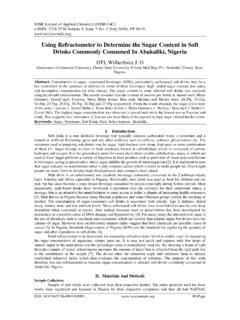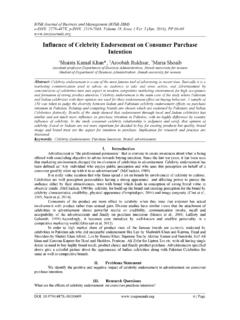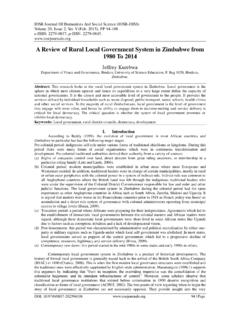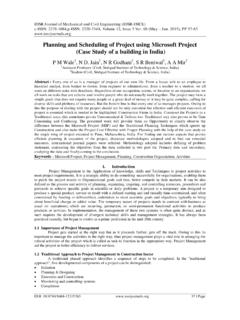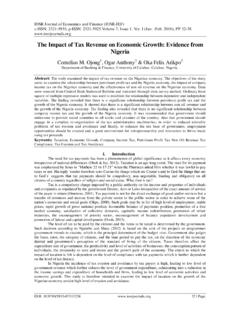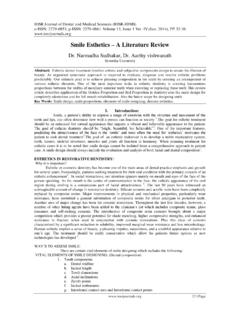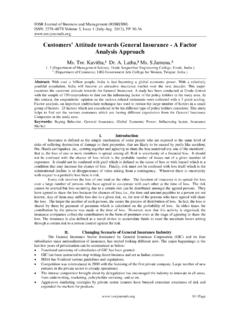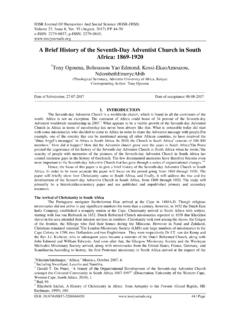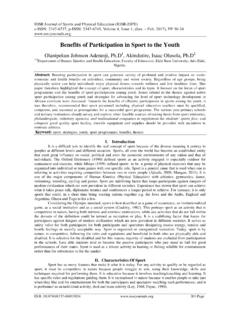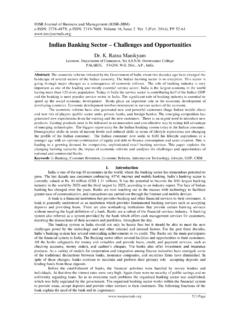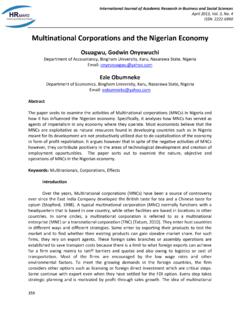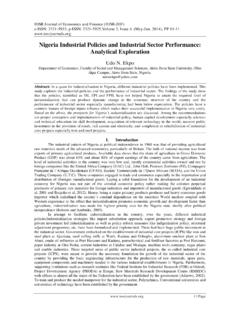Transcription of Globalization and Public Sector Reform in Third …
1 IOSR Journal Of Humanities And Social Science (IOSR-JHSS) Volume 14, Issue 2 (Jul. - Aug. 2013), PP 13-22 e-ISSN: 2279-0837, p-ISSN: 2279-0845. 13 | Page Globalization and Public Sector Reform in Third World Countries: The nigerian Experience Ashaver, Benjamin Teryima Abstract: The 1980 witnessed Public Sector reforms in Third world countries in cognizance with global trends, done principally to re-align the economies of these countries on the path of recovery. Prior to the reforms, the economies of some of the countries were at the verge of collapse. In Africa especially countries that embraced Public Sector reforms did so wholesomely in line with International Monetary Fund and World Bank conditionalities.
2 Generally the reforms did not produce the expected results. This has been largely attributed to faulty premise on which the Reform programmes were anchored, lack of political will by leaders of these countries, lack of transparency in the implementation of the Reform programmes, failure to clearly identify and articulate domestic imperatives vis- -vis response to global necessities. For Public Sector Reform to achieve desired results required getting the basic right. As a worldwide phenomenon, administrative inform has been a widespread challenge to almost all national and sub-national governments around the globe. Unlike the Reform movements of the earlier decades of the twentieth century, which emphasized institution building, bureaucratization, nationalization and a wide variety of organizational and administrative capacity building for national and economic development, the recent global phenomenon of administrative Reform has been in the opposite direction: reversing the traditional role of government, the state, and Public administrations into one that promotes a private, corporate-driven marketplace dominated by business elites.
3 Privatization, commercialization, marketization, and contracting out, together with a number of institutional changes, promote this new ideological trend on a global scale. Under the direct influence of globally dominated superpowers such as the United States and other Western donors, the World Bank, the International Monetary Fund, and the World Trade Organization, have forced almost all less- developed nations to structurally adjust their governments and administrative systems to these new global trends that promote Globalization and enhance the power and profit of globalizing corporate elites (Farazmand 2002). In this context of globalizing pressure, government of both industrialized and less-developed nations have engaged in extensive administrative reforms and reorganizations to streamline their Public sectors by shrinking their size, function and activities.
4 The need to inform traditional governmental organization and administration is to improve administrative machineries, to reduce or eliminate duplication and waste and to increase productivity in Public Sector management. However, it has been obvious that the big push originating from the United States and Britain in the 1980s to privatize, marketize, and commercialize and contract out the Public Sector functions has been driven by ideological as well as economic underpinnings of the market place as a supreme institution in running the economy and society. That the new global administrative reforms must be modernized on the market driven ideological premises have been discovered by many developing counties to be faculty and are tilting towards adopting a balance approach to administrative Reform in governance.
5 The central issues of equality, fairness, and market failure are resurfacing as government after government realizes that the lives of the majority, the ordinary citizens, cannot be ignored in favour of the few the powerful particularistic interest group elite. Therefore, despite the growth of the new Public management modeled after the private Sector corporate management ideology, a more balanced trend of administrative Reform is gradually emerging that reflects prudence and pragmatic approaches to government administration that must serve the broad-based Public interests in nations. This paper aims at examining the much desired change the internationally induced Public Sector reforms have brought on the economic processes in developing countries, with a particular reference to Nigeria.
6 On the basis of findings, a way forward would be proffered. The write-up would be capped with a conclusion. Globalization And Public Sector Reform In Third World Countries: The nigerian Experience 14 | Page I. Definition Of Terms Globalization The term Globalization has acquired considerable emotive force. Some view it as a process which is beneficial a key to future world economic development and also inevitable and irreversible. Others regards it with hostility, even fear, believing that it increases inequality between nations, threatens employment and living standards and thwarts social progress (Chittoo, et al 2009: 32). Globalization offers extensive opportunities for truly worldwide development but it is not progressing evenly.
7 Some countries are becoming integrated into the global economy more quickly than others. Countries that have been able to integrate are seeing faster growth and reduced poverty as is the case in South East Asian countries. Whether seen as a historical process or an ideological construct, Globalization brings about greater interaction between countries, and between people. John Tomlinson (1996) defines it as a rapidly developing process of complex interconnections between societies, cultures, institutions and individual s world-wide. It is a social process which involves a compression of time and space, shrinking distances through a dramatic reduction in the time taken either physically or representationally to cross them, so making the world seen smaller and in a certain sense bringing human beings closer to one another.
8 Thomas Friedman (1996) sees it as the loose combination of free trade agreement, the internet and the integration of financial markets that is erasing borders and uniting the world into a single lucrative, but brutally competitive market place . Globalization reduces the world into an integrated system of markets. In the process, international trade is considered to be the major engine of economic growth, and should therefore be facilitated. This facilitation is to be achieved through trade liberalization, necessitating the removal of tariff and non tariff trade barriers. In addition, states are to withdraw from social provisioning by privatizing state social service organizations. The focus of the Public Sector will be one of policy formulation rather than implementation a series of reforms collectively known as New Public Management (Chitto et al 2009:34).
9 As a matter of fact, during the past three decades there has been an unprecedented wave of reforms as the traditional model of Public administration has come under attack. These reforms originated in developed industrial economics, whose political leaders were under pressure to keep down levels of Public taxation and expenditure, while maintaining high level of welfare and other Public services (Manning, 1996). A significant feature of the reforms was the belief that the state has become too large and over committed, and that the market offered superior mechanisms for achieving the efficient supply of goods and services (World Bank, 1996, 1997). As the Reform movement has spread through Globalization processes, reformers were faced with a choice between old Public administration and new Public management (DunLeavy, and Hood, 1994:9 16), with the additional dimension that the state is also expected to be responsible for the effective management of social and economic development, or development management (World Bank, 1997).
10 Scholars such as manning (2001: 297 312); and Minogue (2011) have attached the new Public management, NPM, models for been flawed, advising that caution must be exercised in exporting it to developing countries. Chittoo and Gaojie, 2003; Spann 1981:12 25; Osborne & Gacbler 1992; one Protagonist, while Schick, 1998; Allen 1999; and Sutch 1999: 1 -3, feel the model is flawed. Minogue, et al 1998; and Batley, 1999 have taken the middle course with the claim that its application has only brought mixed results far below its theoretical promises. We are in fact living in a world where most situations are grey. That they claim that the NPM model is somewhat outdated is exaggerated. The Public administration and the new Public management will co exist with increasing pressure to adopt the new in the era of Globalization (Chitto, et al, 2009: 35).
